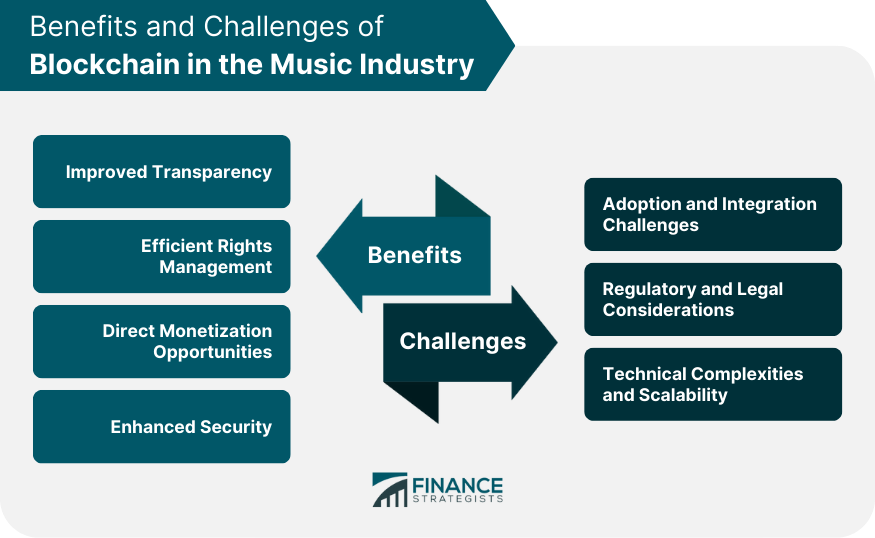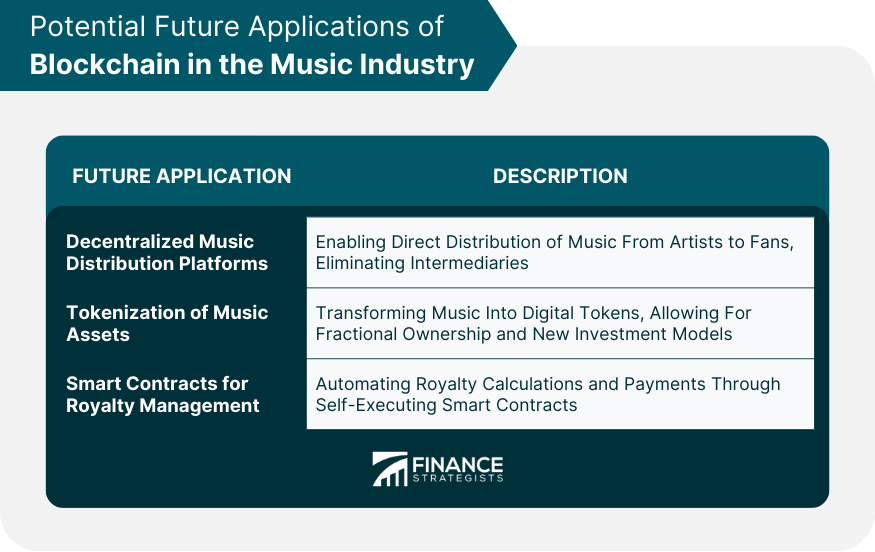Blockchain in the music industry refers to the utilization of blockchain technology to revolutionize various aspects of the music ecosystem. It brings transparency, accountability, and security by creating a decentralized and immutable ledger for managing music rights, royalties, and interactions between artists and fans. Blockchain enables direct artist-to-fan interactions, simplifies rights management, and ensures fair compensation for artists while offering enhanced security against piracy and unauthorized use of intellectual property. By leveraging blockchain, the music industry aims to create a more transparent, efficient, and equitable environment for all stakeholders involved. Moreover, the integration of blockchain in the music industry could also facilitate new business models, such as tokenized ownership or crowd-funded projects, thus opening up novel avenues for artists to monetize their work and interact with their audience. Blockchain technology has brought about significant transformations in the music industry, revolutionizing various aspects of its operation and addressing long-standing challenges. Blockchain ensures transparency and accountability in the music industry by providing a decentralized and immutable ledger of transactions. Unlike traditional systems that rely on intermediaries, blockchain allows for a transparent flow of information and a clear record of ownership, enabling artists to receive fair compensation for their work. By removing the opacity often associated with royalty distribution, blockchain fosters trust among stakeholders and eliminates discrepancies. The music industry has long struggled with complex rights management and royalty distribution systems. Blockchain technology simplifies this process by utilizing smart contracts. These self-executing contracts automatically enforce the terms of agreements, ensuring accurate and timely royalty payments to artists. By digitizing rights and licensing information on the blockchain, artists and other stakeholders can easily track and manage ownership, simplifying the licensing process and reducing administrative costs. Blockchain facilitates direct interactions between artists and their fans, fostering a closer and more meaningful connection. Decentralized platforms powered by blockchain technology enable artists to engage directly with their fan base, offering exclusive content, merchandise, or even crowdfunding opportunities. This direct engagement strengthens the artist-fan relationship, empowers artists to have more control over their creative output, and creates new avenues for fan support and engagement. The decentralized and tamper-proof nature of blockchain technology provides enhanced security and robust anti-piracy measures in the music industry. By registering their work on the blockchain, artists can establish a permanent and immutable record of ownership. This helps to prevent unauthorized use, piracy, and copyright infringement. With blockchain, artists can protect their intellectual property and ensure that they receive proper recognition and compensation for their creations. Blockchain provides transparency in royalty distribution by recording every transaction on a public ledger. This transparency eliminates the need for intermediaries and reduces the risk of fraudulent activities or misappropriation of funds. Artists can have greater visibility into how their music is being consumed and compensated, ensuring a fair distribution of royalties. Blockchain simplifies rights management by digitizing and automating the licensing process. Smart contracts enable automated royalty calculations and payments based on predetermined conditions. This eliminates the need for manual reconciliation and reduces administrative overhead, streamlining the process of licensing and rights management. Blockchain technology offers artists direct monetization opportunities by enabling the creation and sale of digital assets. Artists can tokenize their music or other creative works, transforming them into unique digital assets represented by tokens. These tokens can be bought, sold, or traded, allowing artists to engage directly with fans and monetize their creations beyond traditional revenue streams. Tokenization opens up new possibilities for crowdfunding, fan-driven investment, and fractional ownership of creative works. The decentralized and immutable nature of blockchain provides heightened security against intellectual property theft in the music industry. By timestamping and registering their work on the blockchain, artists can establish proof of ownership and protect their creations from unauthorized use or plagiarism. This not only safeguards artists' rights but also creates a more trustworthy and secure environment for all stakeholders in the industry. The widespread adoption of blockchain in the music industry requires overcoming adoption and integration challenges. Education and awareness about blockchain technology among artists, industry professionals, and stakeholders are essential. Additionally, integrating blockchain into existing systems and processes may require significant changes and coordination among various players in the industry. The integration of blockchain technology into the music industry raises regulatory and legal considerations. Intellectual property rights, licensing agreements, and data privacy regulations need to be navigated to ensure compliance. Industry-wide collaboration and the development of standardized frameworks are necessary to address these regulatory and legal challenges effectively. Implementing blockchain technology at scale in the music industry poses technical complexities and scalability issues. Blockchain networks need to handle a high volume of transactions efficiently while maintaining speed, security, and cost-effectiveness. Addressing these technical challenges requires robust infrastructure, interoperability, and continuous innovation in blockchain technology. The potential of blockchain technology in the music industry extends beyond the current applications. Here are some future possibilities: Blockchain enables the creation of decentralized music distribution platforms where artists can release their music directly to fans without the need for intermediaries. This eliminates barriers to entry, empowers independent artists, and provides fairer revenue-sharing models. Fans can discover new music directly from artists, creating a more dynamic and inclusive music ecosystem. Tokenization offers the opportunity to transform music and other creative assets into digital tokens. These tokens represent ownership and can be traded on blockchain-powered platforms. Tokenization allows artists to monetize their catalog, offering fractional ownership and creating new investment opportunities for fans and music enthusiasts. Smart contracts can revolutionize royalty management by automating the calculation and distribution of royalties. Through self-executing contracts, artists can receive real-time payments based on predefined terms, eliminating the need for intermediaries and minimizing delays. Smart contracts provide transparency, accuracy, and efficiency in royalty management. Blockchain technology has the potential to transform the music industry, providing transparency, efficiency, and security. By enabling direct artist-to-fan interactions, improving rights management, and ensuring fair royalty distribution, blockchain empowers artists and creates new opportunities for monetization. Despite the challenges of adoption, regulations, and scalability, the future of blockchain in the music industry looks promising. Decentralized distribution platforms, tokenization of music assets, and smart contract-based royalty management are poised to reshape the industry. As stakeholders collaborate and overcome these challenges, the music industry can embrace blockchain's potential and create a more transparent, fair, and artist-centric ecosystem for all. Consider seeking professional wealth management services to navigate this burgeoning landscape and maximize your investments in this potential-filled space. It can provide strategic guidance and help optimize financial decisions in the transformative blockchain-driven music industry.Overview of Blockchain in the Music Industry
How Does Blockchain Impact the Music Industry?
Transparency and Accountability
Rights Management and Royalties
Direct Artist-To-Fan Interactions
Enhanced Security and Anti-Piracy Measures
Benefits and Advantages of Blockchain in the Music Industry
Improved Transparency in Royalty Distribution
Efficient Rights Management
Direct Monetization Opportunities for Artists
Enhanced Security Against Intellectual Property Theft
Challenges of Blockchain Adoption in the Music Industry
Adoption and Integration Challenges
Regulatory and Legal Considerations
Technical Complexities and Scalability Issues

Potential Future Applications of Blockchain in the Music Industry
Decentralized Music Distribution Platforms
Tokenization of Music Assets
Smart Contracts for Royalty Management

The Bottom Line
Blockchain in the Music Industry FAQs
Blockchain enhances transparency, rights management, and security and enables direct artist-to-fan interactions.
Benefits include improved transparency in royalty distribution, efficient rights management, direct monetization opportunities, and enhanced security.
Adoption challenges include limited awareness and technical complexities, while regulatory considerations and scalability are also important factors.
Blockchain enables decentralized music distribution platforms, allowing artists to release music directly to fans, removing intermediaries.
Future applications include tokenization of music assets, smart contracts for royalty management, and decentralized music distribution platforms.
True Tamplin is a published author, public speaker, CEO of UpDigital, and founder of Finance Strategists.
True is a Certified Educator in Personal Finance (CEPF®), author of The Handy Financial Ratios Guide, a member of the Society for Advancing Business Editing and Writing, contributes to his financial education site, Finance Strategists, and has spoken to various financial communities such as the CFA Institute, as well as university students like his Alma mater, Biola University, where he received a bachelor of science in business and data analytics.
To learn more about True, visit his personal website or view his author profiles on Amazon, Nasdaq and Forbes.











